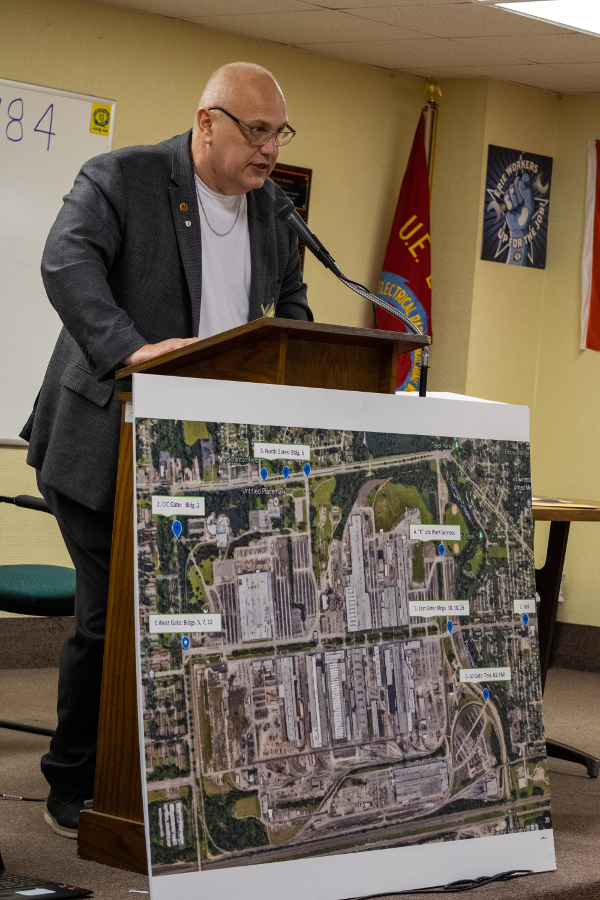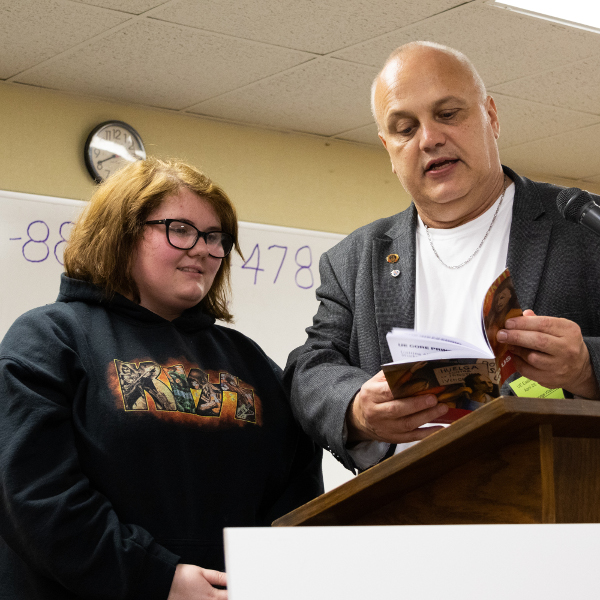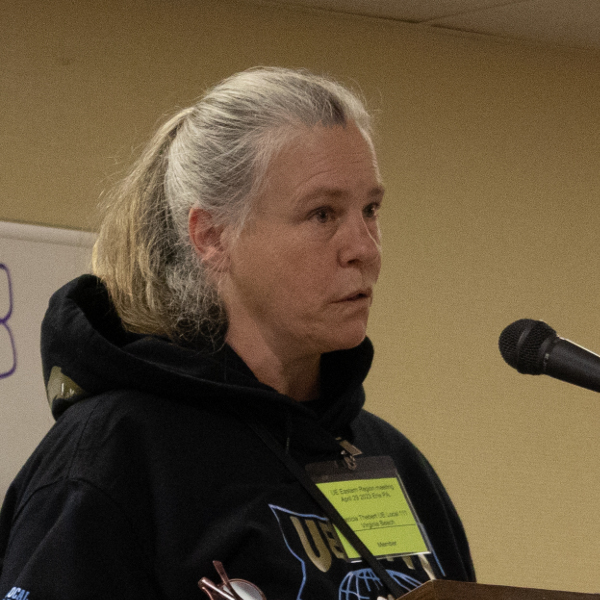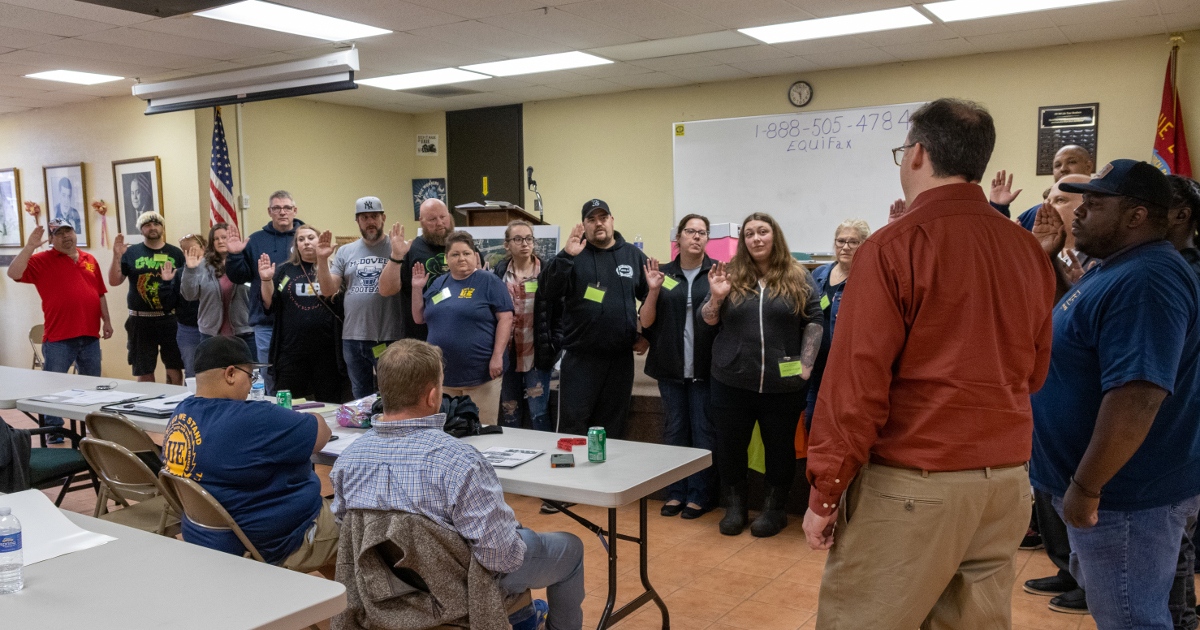
UE Eastern Region President George Waksmunski.
Standing at the podium in the UE Local 506 hall, behind a large blow-up map of the Wabtec plant where Local 506 members work, its gates marked to facilitate plans for picket duty, UE Eastern Region President George Waksmunski welcomed delegates to the Eastern Region council meeting here on Saturday, April 29.
Local 506’s contract with Wabtec expires on June 9, along with the contract of their sister Local 618. In the words of Local 506 delegate Mike Giles, who gave part of his local’s shop report, “We’re in for a hell of a fight.”
Local 506 Business Agent John Miles reported that Wabtec “just doesn’t want to budge on anything,” a stance that Local 506 leaders attribute to the fact that the local gave up their right to strike over grievances in their first contract after Wabtec purchased their plant in 2019. They are determined to regain that right in their second contract.
Miles extended an invitation to other UE locals “to come up and see what happens” when a seasoned and well-organized UE local is determined to make improvements in their working conditions and is prepared to engage in aggressive struggle to win. (Watch: Local 506 members “march down the avenue” in their plant for the right to strike.)
Aggressive Struggle
Aggressive struggle was a key theme of the council meeting, from President Waksmunski’s remarks, to shop reports from across the region, to the photos of historic strikes by Locals 506 and 618 on the cover of delegate packets (and the photos of Local 506 and 618’s nine-day strike against Wabtec in 2019 posted throughout the hall).
During his president’s report, Waksmunski presented a slideshow of both UE members currently engaged in struggle and photographs of UE struggles from the past. He noted that in the 1930s and 1940s, at the height of the battles that established UE and other industrial unions, UE members were unafraid to engage in militant struggle even when the companies employed the police and national guard to violently suppress strikes.

President Waksmunski showing Them and Us Unionism to the youngest guest at the council meeting.
Throughout the day, Waksmunski presented copies of the UE booklet Them and Us Unionism to first-time delegates and guests, including the youngest guest present — Local 625 delegate Sharon Johnston’s granddaughter Courtney. “If you want to be a rebel, this is the book to read,” Waksmunski told her.
(Them and Us Unionism outlines UE’s five principles: aggressive struggle, rank and file control, political independence, international solidarity and uniting all workers. It can be read online here and copies can be purchased from the UE online store.)
The council also celebrated UE’s spirit of militancy with song and chant. Nichel Dunlap-Thompson, Local 150, led the group in singing We Shall Overcome in the morning, and following lunch, Kristin Ammons of Local 256 (MIT-GSU) energized delegates and guests by leading them in a rousing series of chants.
“With collective bargaining we can only imagine what more we can accomplish”

Alex Peeples
Delegates also heard reports from aggressive struggle on the new-organizing front, from campaigns that are bringing thousands of new members into the Eastern Region. At Johns Hopkins University in Baltimore, Teachers and Researchers United-UE won an NLRB election covering over 3,000 graduate workers in January, with a 97 percent margin of victory. TRU-UE leader Alex Peeples reported that, despite working for a university with an $8 billion endowment, which pays its president $3 million per year, graduate workers are forced to contend with leaks, mold and mice in the labs they work in, and “people can’t live on what Hopkins is paying us.” TRU is determined to change that as bargaining for a first UE contract begins on May 10.

David Freeman
David Freeman from Graduate Organized Laborers of Dartmouth-UE described how the 800 graduate workers at Dartmouth College in Hanover, New Hampshire organized their union in response to “very heinous cases of abuse by advisors of their students” and because “it’s almost impossible to have a family” while pursuing a graduate degree at Dartmouth due to lack of options for childcare.
In an effort to delay union recognition, the college announced one week before the April NLRB vote that they intended to challenge the eligibility of over half of the workers in the bargaining unit, hoping to drag out the election results in court for years as ballots were challenged. However, GOLD-UE was sufficiently well-organized that they were able to turn out hundreds of unchallenged votes to the polls, while simultaneously organizing those workers whose votes would have been challenged to abstain from voting and hold a “right to vote” rally instead. As a result, the union won the election 261-33, a wide enough margin to squash the college’s ability to challenge the election’s validity.
City workers in Virginia Beach have been organizing with UE since a walkout by sanitation workers in 2020, and last fall they were successful in electing a pro-collective bargaining majority to their city council. (Virginia’s 2021 law allowing collective bargaining for municipal workers requires that the city council first pass a resolution enabling it.) However, workers have been frustrated by the slow pace of progress towards passing that resolution.

Pat Thebert
Chief Steward for the Virginia Beach City Workers Union Pat Thebert reported that “We will be doing a rally to make them remember, they pushed us off to June and we want our collective bargaining.” She noted that last spring the union won a $15 minimum wage, a new step system and sizable wage increases in the city budget, and declared that “when we get collective bargaining we can only imagine what more we can accomplish.”
Union Chairperson Terry Green noted, however, that even the $15 per hour starting rate is insufficient, especially for skilled jobs like heavy equipment operators. He said “we’re going to stay understaffed as long as we’re dealing with” what he called “confederate wages.”
“We’re going into our last bargaining session fighting.”

Kristen Ammons
Kristen Ammons from UE Local 256 (MIT-GSU) reported on negotiations for a first UE contract for approximately 4,000 graduate workers at the Massachusetts Institute of Technology, who began bargaining in September. A couple of weeks ago, Ammons said, the local held its “most disruptive action” so far, an all-day picket during MIT’s “campus preview” weekend.
Although MIT has net assets of $32 billion, Ammons said that had been telling the union that “covering graduate worker dental insurance would bankrupt the institute” — but that “after the picket, for the first time, dental insurance was brought to the table.” She also reported that they have won “some of the strongest health and safety language in the country” for graduate workers — a key issue for her local, where many bargaining unit members work with heavy machinery and toxic chemicals.
However, key issues remain unsettled, including compensation and the right to grieve gender-based discrimination. Ammons noted that the Boston metro area is the second-most expensive U.S. city to live in, and that many Local 256 members would qualify for food stamps if they weren’t excluded due to their student status. She also said that at MIT one out of two women, one out of three men, and three out of five trans and non-binary graduate workers will face gender-based harassment from their advisor — and need to be able to file a grievance when it happens.
Ammons said that Local 256 was planning to hold another picket on Monday, May 1, and said “We’re going into our last bargaining session of the semester [on May 4] fighting.”
UE Field Organizer Valentina Luketa concluded the organizing report with the exciting news that, just that week, approximately 5,000 graduate workers at the University of Minnesota had voted for UE by a 97 percent margin. This victory was especially sweet, as prior to this union drive, UMN grad workers had seen several unsuccessful attempts to organize (including one with UE in 2005).
“There’s a role for you all to play”
In his National Officer Report, UE General Secretary-Treasurer Andrew Dinkelaker gave a passionate speech about the importance of members taking an active role in their union. “It’s the membership and your decision to step up” that makes UE the democratic, member-run union that is it, he said. He reminded delegates that no matter what their position in the union, “There’s a role for you all to play.”
Speaking about the current working-class upsurge of organizing, strikes and militance, Dinkelaker said that “the working class is frustrated” about decades of the rich getting richer, because they know that “the deck is stacked.” He reported that “UE is pulling more than its own weight” in the current moment.
Dinkelaker then reviewed plans for UE’s 78th National Convention, which will be held from September 17-21 in Pittsburgh. He noted that the convention will be “our first chance to come together nationally since the pandemic.” The theme of the convention will be “Building Strike Power,” in recognition of the fact that workers’ “core power” is “the withholding of labor,” and also of Local 506’s “historic fight to regain the right to strike over grievances.”
During the Political Action Report, the region voted to endorse long-time UE ally Sara Innamorato’s bid for County Executive of Allegheny County (the county including Pittsburgh); Innamorato had previously been endorsed by two of UE’s locals in Allegheny County, Locals 610 and 667.
Delegates re-elected President Waksmunski, Vice President Antwon Gibson, Local 610, and Secretary-Treasurer Scott Slawson, Local 506. Elizabeth Jesdale, Local 255, was elected recording secretary. Elected to the region’s executive board were Jim Borowski, Local 106, Zeke Harouff, Local 123, Bryce Carter, Local 150, Leslie Riddle, Local 170, Em Hammond, Local 221, Margaret Dabrowski, Local 222, Jane Shepard-O’Connor, Local 228, Dean Pacileo, Local 243, Amber Hannigan, Local 255, Marc Avery, Local 274, Bud Decker, Local 329, John Miles, Local 506, Jeff Kohler, Local 610, Alison Oniboni, Local 613, Karleen Torrance, Local 618, Sharon Johnston, Local 625, Brian Desanto, Local 642, Breezy Mueller, Local 667, and Tony Hall, Local 690. Borowski, Carter, Dabrowski, Decker and Hannigan were elected as at-large representatives to the General Executive Board, and Carter and Hannigan were elected as regional delegates to the national convention. Dominic Harris, Local 150, and Buffy Smith, Local 506, were elected as trustees, and Megan Hedrick, Local 123, was elected as alternate trustee.

UE General Secretary-Treasurer Andrew Dinkelaker (at right, in rust-colored shirt) swearing in the officers and executive board of the UE Eastern Region.
